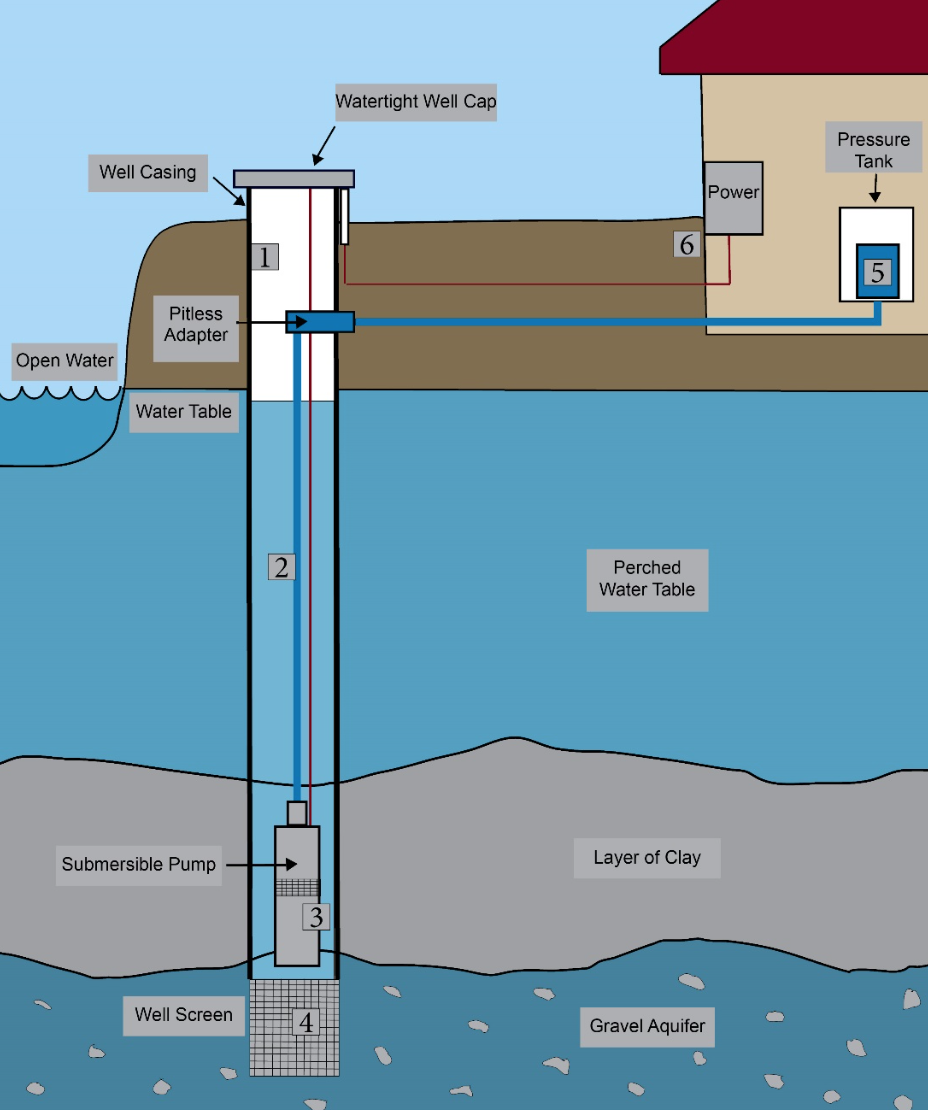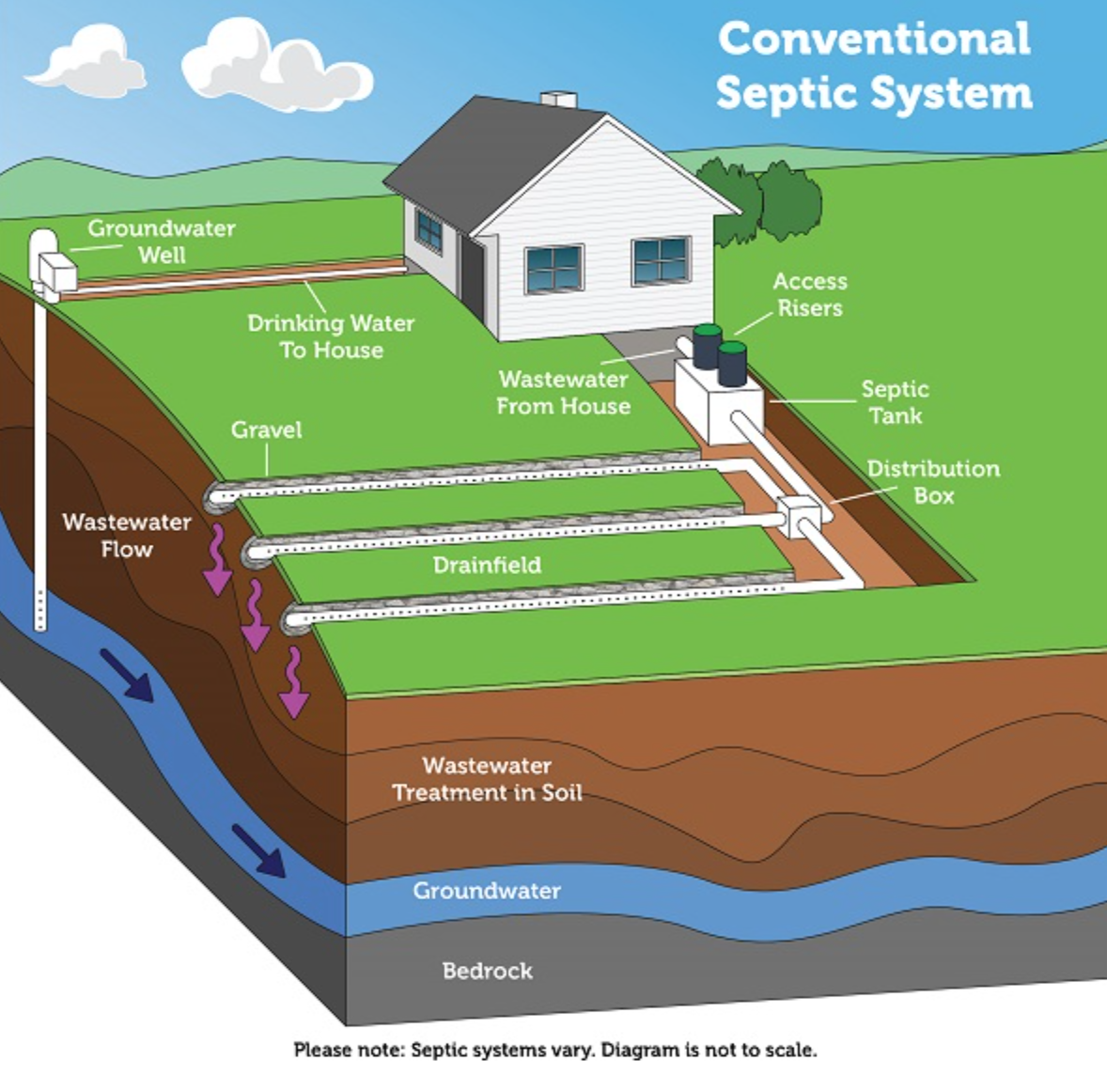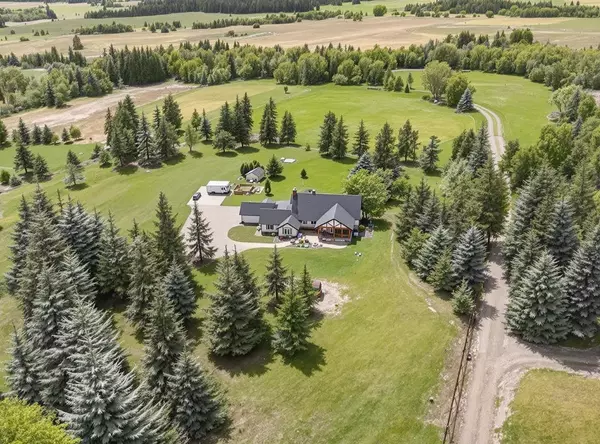The Complete Guide to Buying Acreage in Parkland County: Wells, Septic, and What You Need to Know!
The Complete Guide to Buying Acreage in Parkland County: Wells, Septic, and What You Need to Know
Thinking about trading city living for the peace and space of acreage life?
As someone who's helped countless families make this transition in Parkland County, I've learned that the dream of rural living comes with unique considerations that most buyers aren't prepared for.
Here's everything you need to know before you buy!
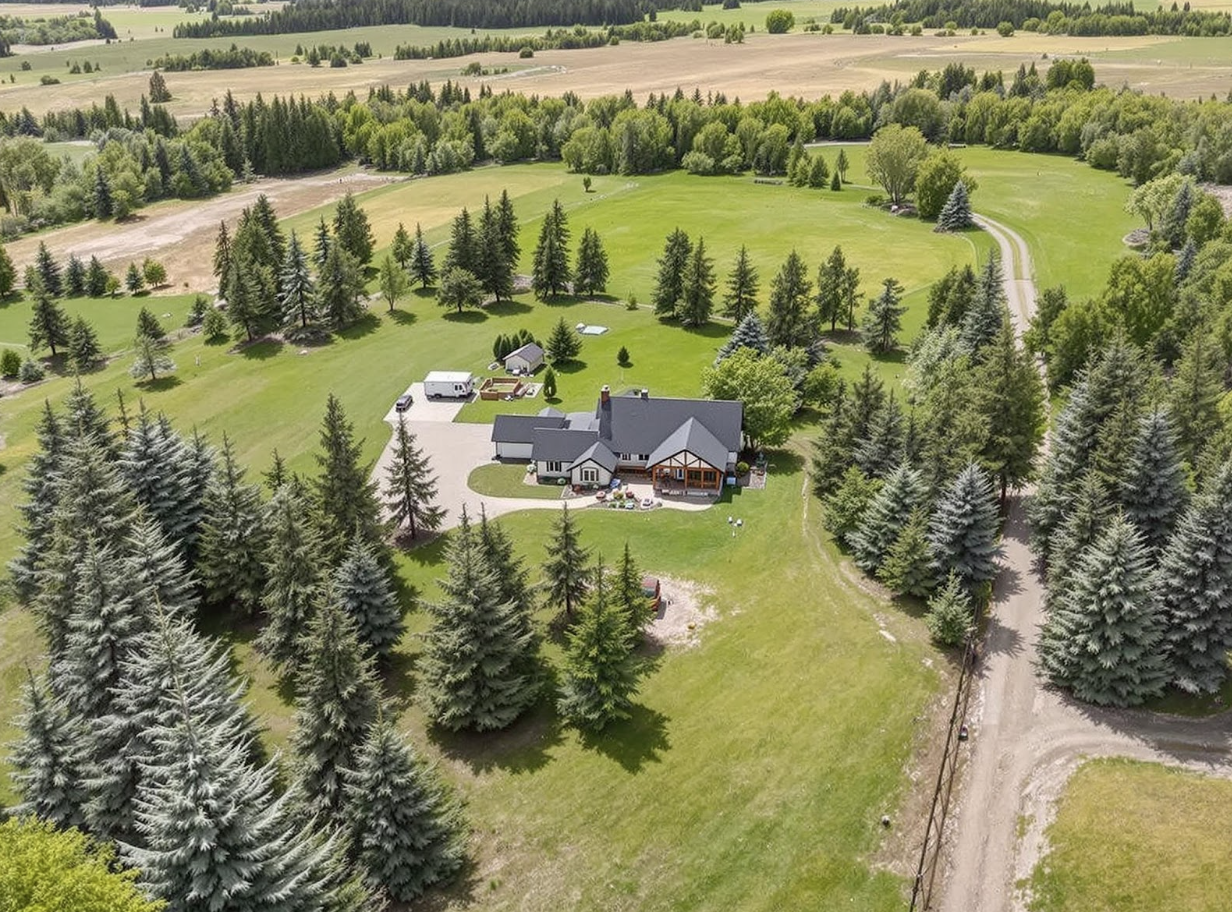
Why Parkland County Acreages Are Different
Buying an acreage isn't like buying a house in Spruce Grove or Edmonton. You're not just purchasing a home – you're investing in a complete rural lifestyle that comes with both incredible rewards and specific responsibilities. After years of helping families navigate acreage purchases through my Home Run Method, I've seen the same questions come up repeatedly. The transition from city to country living requires understanding systems and seasonal realities that most urban buyers have never encountered.
The beauty of acreage living lies in the independence and space it provides, but this freedom comes with the responsibility of managing your own water, septic, and utility systems. Unlike city properties where municipal services handle these essentials, acreage owners become stewards of their own infrastructure. This shift in responsibility can feel overwhelming at first, but with proper guidance and preparation, it becomes part of the rewarding rural lifestyle that draws so many families to Parkland County.
Water Systems: Your Lifeline to Rural Living
Water access is perhaps the most critical consideration when buying acreage. Your water system will be one of your largest ongoing investments and most important daily necessities. Understanding your options helps you make informed decisions that align with your family's needs and budget.
Wells: The Gold Standard
Most acreage buyers dream of having their own well, and for good reason. A properly maintained well represents true independence from municipal water systems and provides long-term cost savings that can significantly impact your monthly budget. Wells also increase property value and give you control over your water quality and usage.
When evaluating a property with a well, you'll want to examine recent water quality test results, well depth and flow rate documentation, and the age and condition of the pump system. Proper wellhead protection and casing are essential for maintaining water quality and preventing contamination. I always recommend having a well inspection done by a qualified professional before finalizing any acreage purchase.
Cisterns and Holding Tanks: The Alternative
Some properties rely on cisterns, which are large water storage tanks that require regular water delivery. While this might sound inconvenient to city dwellers, many families actually prefer this system because it offers lower upfront costs, eliminates concerns about water quality fluctuations, and provides predictable monthly expenses that are easy to budget.
Key considerations for cistern systems include:
- Tank capacity and delivery frequency requirements
- Year-round access for delivery trucks
- Backup plans during extreme weather conditions
- Cost comparison with well installation and maintenance
Septic Systems: Understanding Your Options
Your septic system is just as important as your water source, and choosing the right system depends on your property's soil conditions, your family size, and your long-term plans. Parkland County's varied soil conditions mean that what works on one property might not be suitable for another.
Traditional Septic Systems
The most common setup includes a septic tank and drain field, which work well in Parkland County's soil conditions when properly designed and maintained. These systems offer lower maintenance costs and use proven technology that local contractors understand well. However, they require adequate soil absorption and can be affected by seasonal ground saturation, particularly during spring thaw.
Traditional septic systems work best for families who want a straightforward, cost-effective solution and have suitable soil conditions. The main limitation is capacity – if you have a large family or frequently entertain guests, you might need to consider alternatives.
Treatment Plants with Mounds
For properties with challenging soil conditions or higher capacity needs, treatment plants with mound systems offer a reliable solution. These systems work in poor soil conditions, provide higher processing capacity, and are better suited for larger families or those who frequently entertain.
The trade-offs include higher upfront and maintenance costs, electrical power requirements, and more complex systems that require professional servicing. However, for the right property and family situation, these systems provide reliable performance where traditional septic wouldn't work.
Seasonal Realities: What City Buyers Don't Expect
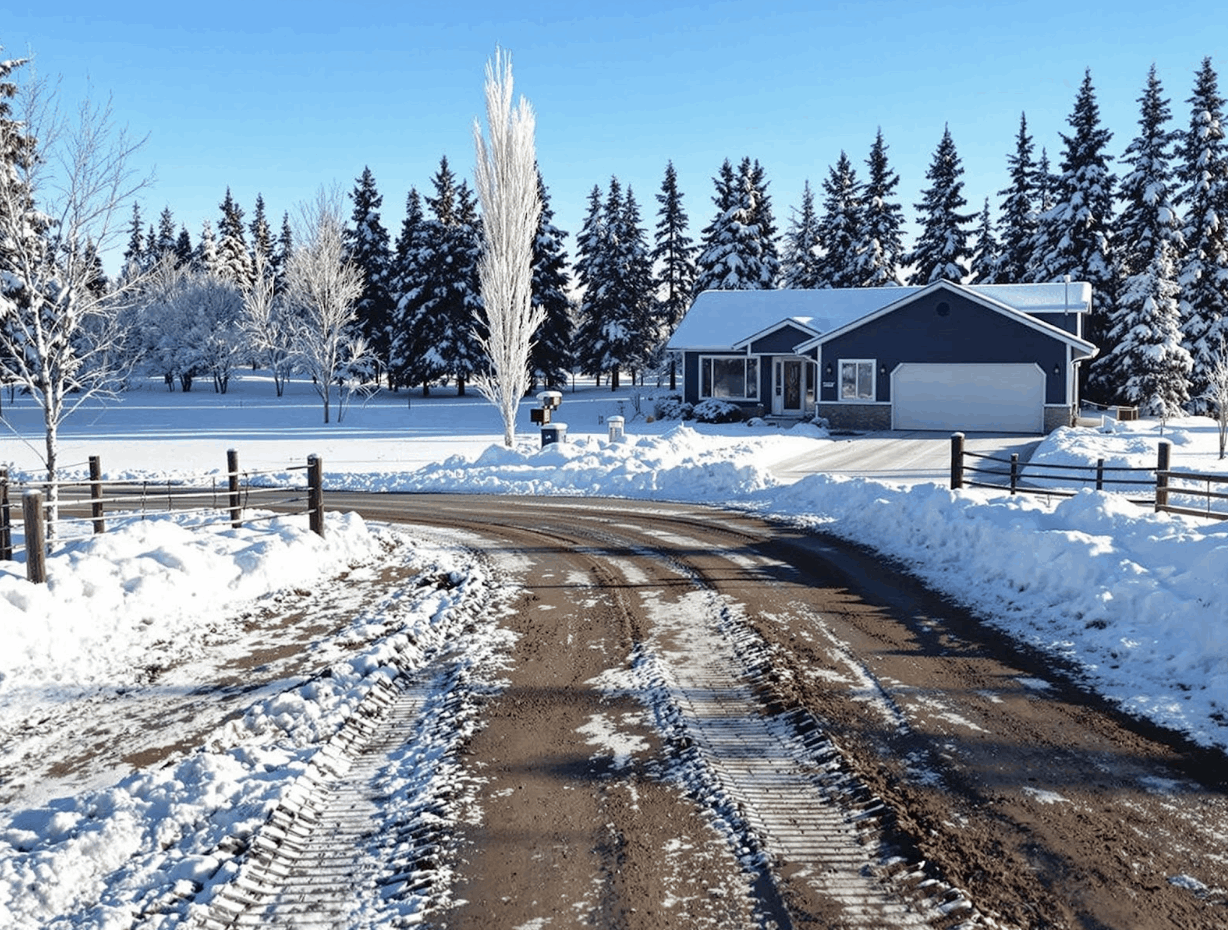
Living in Parkland County means embracing seasonal challenges that simply don't exist in urban Edmonton. These realities aren't deal-breakers, but they require planning and preparation that many first-time acreage buyers underestimate.
Winter brings unique considerations that go beyond just colder temperatures. While county roads are plowed, your driveway maintenance becomes your responsibility – and a long, winding driveway can become impassable without proper equipment or planning. Spring thaw can temporarily affect septic field performance as ground saturation increases, and water line protection becomes crucial to prevent costly freezing issues.
Spring challenges often catch new acreage owners off guard. Poor property grading can create seasonal flooding issues that weren't apparent during summer or fall viewings. Road conditions can deteriorate rapidly with frost heaves and mud, making property access difficult. This is why I always recommend viewing properties multiple times throughout different seasons when possible.
Key seasonal considerations include:
- Driveway maintenance and snow removal responsibilities
- Septic system performance during spring thaw
- Water line insulation and freeze protection
- Higher heating costs for larger properties
- Emergency access planning for severe weather
The Financial Reality: Taxes and Services
Understanding the financial implications of acreage ownership goes beyond the purchase price. Property taxes on acreage are typically lower than urban properties, but you're also receiving fewer municipal services. This trade-off often works in favor of acreage owners, but it's important to understand exactly what you're getting and what you're responsible for. Another note is that insurance is generally more expensive averaging out the costs of the tax to insurance.
Parkland County property taxes are generally assessed closer to market value despite fewer services, and agricultural exemptions may apply to larger parcels depending on their use. However, you won't receive municipal water and sewer, garbage collection, street lighting, or sidewalk maintenance. What you do get includes road plowing in winter, landfill cards for waste disposal, fire protection services, and emergency services access.
Zoning and Utilities: Know Before You Buy
Zoning designations significantly impact what you can do with your property. Residential versus agricultural designations affect everything from home-based business regulations to outbuilding restrictions and livestock permissions. Understanding these limitations before purchase prevents costly surprises later.
Utility access varies significantly across Parkland County. Electrical service is usually available but may require upgrades for larger properties or specific needs. Natural gas isn't available in all areas, making propane a common alternative. Internet and phone service often rely on satellite or wireless options, and you'll need to factor in access for propane delivery trucks when planning your property layout.
Red Flags Every Acreage Buyer Should Watch For
After helping dozens of families avoid costly mistakes, I've learned to identify warning signs that can save buyers thousands of dollars and years of frustration. Water system red flags include properties with no recent water quality tests, visible rust or mineral staining, inconsistent water pressure, or neighbors reporting ongoing water issues.
Septic system warning signs are often subtle but critical to identify:
- Soggy areas in the yard, especially near the drain field
- Sewage odors around the property
- Slow drains throughout the house
- Unusually lush grass over the drain field area
Property access issues can create ongoing problems that affect both daily life and emergency situations. Shared driveways without proper legal agreements, steep grades that become impassable in winter, inadequate turnaround space for emergency vehicles, and drainage issues that affect road access are all concerns I help my clients identify and address.
Making the Right Choice for Your Family
The decision between different water and septic systems ultimately comes down to your family's specific needs, comfort level with maintenance, and long-term plans. There's no universally "right" choice – only the right choice for your situation.
Choose wells and traditional septic systems if you want maximum independence, are comfortable with system maintenance, have good soil conditions, and plan to stay long-term. These systems offer the most autonomy and can provide excellent long-term value for families committed to rural living.
Consider cistern and treatment plant systems if you prefer predictable monthly costs, have challenging soil conditions, want less hands-on maintenance, or are unsure about your long-term plans. These systems often work better for families transitioning from city living who want rural space without taking on extensive system maintenance responsibilities.
Your Next Steps
Buying an acreage in Parkland County is an investment in your family's lifestyle, but it requires careful planning and expert guidance. Through my Home Run Method, I help clients navigate this complex process by providing property assessment before offers, coordinating inspections with specialists who understand rural systems, helping plan purchases around seasonal considerations, and discussing long-term family needs.
My construction background gives me unique insight into system quality and potential issues that other agents might miss. I've seen too many families make costly mistakes that could have been avoided with proper guidance upfront.
Ready to Start Your Acreage Journey?
Every family's path to acreage living is different, but the destination is the same: more space, more privacy, and more connection to the land. With proper planning and the right guidance, your transition from city to country can be smooth and rewarding.
If you're considering an acreage in Parkland County, Sturgeon County, or Lac Ste. Anne County, let's talk about what matters most to your family. I've helped dozens of families make this transition successfully, and I'd love to help you find the perfect property for your rural dreams.
Ready to explore acreage options? Contact me at (780) 934-0093 or james@homerungroup.ca Let's discuss your family's needs and find the acreage that's perfect for your lifestyle.
James Mramor is a real estate agent with Home Run Group, affiliated with Real Broker, specializing in acreage and rural properties throughout Parkland County, Lac St Anne County, Sturgeon County, Strathcona County, and surrounding areas. With extensive construction background and local market expertise, James helps families navigate the unique challenges of rural property ownership.

